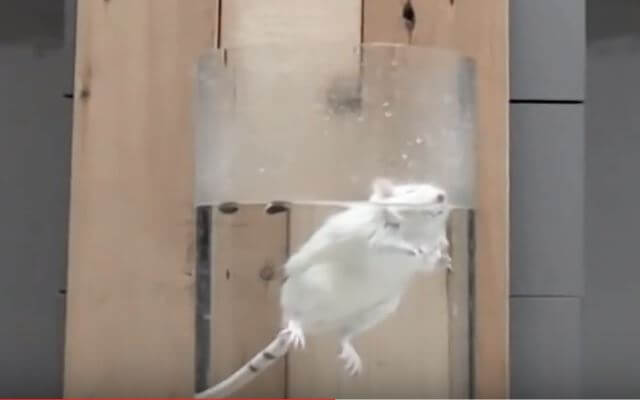AI Is Waging a War Against the Forced Swim Test
PETA’s been saying it for years: Nearly drowning animals isn’t “research.” Gentle, social mice and rats are living, feeling beings—not objects for experimenters to use and kill in the cruel forced swim test. We’ve gotten our point across loud and clear—now, though, we’re letting artificial intelligence (AI) do the talking.
As our relentless work to replace animals in laboratories with human-relevant research methods shows, PETA’s all about embracing modern technology. That’s why we employed modern AI tools to help bolster our case against the bogus forced swim test.
According to ChatGPT, here’s why the forced swim test should be banned.
The Forced Swim Test: An Overview
The forced swim test, also known as the “behavioral despair” or “hopelessness” test, is a procedure in which rodents, such as mice and rats, are placed in an inescapable container filled with water. With no way out, the animals are forced to float. Experimenters use this test to study depression and anxiety. However, the test is not only flawed but also cruel and inhumane.
- The Forced Swim Test Is Irrelevant and Ineffective
The forced swim test is an antiquated procedure that has shown little to no relevance in developing treatments for human depression or anxiety. The test is fundamentally flawed, as the results do not translate to humans, given the vast physiological and psychological differences between humans and mice or rats.
- The Forced Swim Test Has Been Heavily Criticized
Many scientists have criticized the test, stating that it doesn’t accurately model the complex nature of human depression. Furthermore, the test has failed to produce effective medications for many of the companies that have used it. In a world in which alternative methods, such as computer modeling, are on the rise, there’s no justification for clinging to an ineffective and harmful test.
- It’s Cruel to Animals
The forced swim test subjects animals to physical and psychological distress. The animals used in the test are sentient beings capable of experiencing pain, fear, and suffering. It’s morally reprehensible to deliberately induce despair in any living, feeling being. In the test, rodents are subjected to the terror of drowning—a fear that’s universal for both humans and animals. The animals often become disoriented, panicked, and traumatized. Subjecting them to such intense stress for an experiment that has no scientific value is wholly unjustifiable.
- Technologically Advanced Animal-Free Methods Are Available
The advancement of science and technology has led to the development of alternative methods to study depression and anxiety. These alternatives not only eliminate the need for animal testing but also often provide more accurate results that can be directly applied to human medicine. Techniques such as computer modeling, human cell and tissue cultures, and advanced brain imaging offer insight into the intricate workings of the human brain without harming animals.
AI is exposing the forced swim test with these haunting photo-realistic illustrations.
DALL-E generated these images of mice nearly drowning in the forced swim test:
They are pretty close to the way it really looks:
These scathing AI-generated tweets can help you put companies that refuse to ban the forced swim test on blast:
- @EliLillyCo, many of your competitors have already banned the forced swim test. What are you waiting for? Be part of the solution, not the problem. #TimeForChange #PETA
- Nearly drowning animals in the name of science? @EliLillyCo, this cruel test has no place in modern research. Choose compassion. #BanForcedSwimTest #PETA
- Scientists have spoken: The forced swim test is ineffective & cruel. @Sanofi, it’s time to move forward with alternative methods. #ChooseCompassion #PETA
Take Action to End the Forced Swim Test
AI tools can do far more than provide answers to hard-hitting questions like “Why should we ban the forced swim test?” Learn more about how AI and virtual reality (VR) are replacing experiments on animals.
Rats and mice are family-oriented, sensitive, empathetic animals. There is no moral justification for subjecting them to the traumatizing distress of near-drowning tests. Please join PETA in urging Eli Lilly to ban this cruel experiment:



